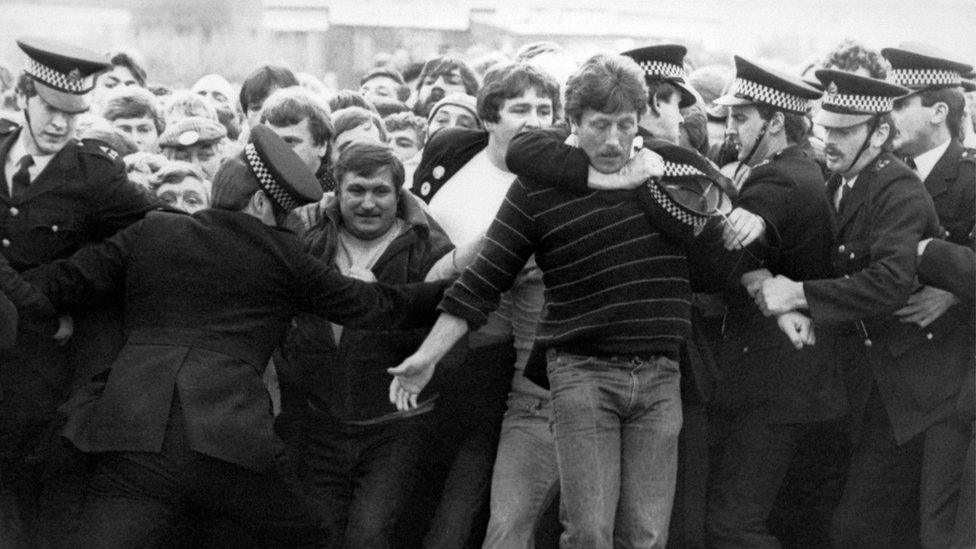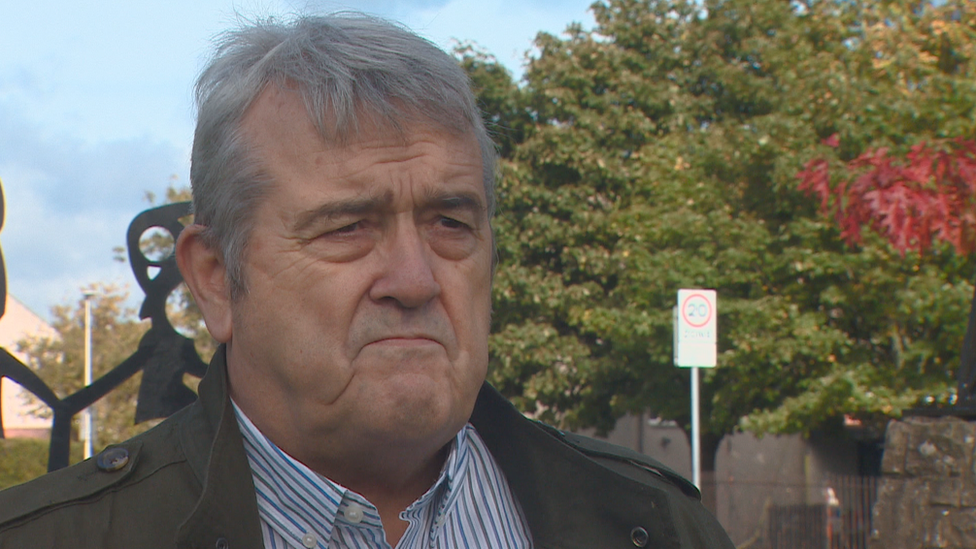Scottish miners convicted during strike to be pardoned
- Published

Police restrain picketers outside a pit during the miners' strike
Miners convicted during the year-long strike in the 1980s are to be pardoned by the Scottish government.
It is believed about 1,400 miners were arrested and more than 500 were convicted during the national dispute.
A review commissioned by ministers said it was unlikely many of the miners would face prosecution for their actions today.
The Scottish government said the collective pardon would require new legislation.
It said it would also apply to miners who had died since the 1984-85 strike.
Justice Secretary Humza Yousaf said the pardon was intended to acknowledge "the disproportionate impacts arising from miners being prosecuted and convicted during the strike - such as the loss of their job".
The National Union of Mineworkers (Scotland) has welcomed the announcement.
Violent clashes
Millions of people protested against pit closures during the industrial dispute with Margaret Thatcher's government.
Throughout the summer of 1984 there were violent clashes between striking miners and police, whose numbers often ran into several hundred at each confrontation.
Violence led to widespread use of the breach of the peace charge.
The independent review, chaired by human rights lawyer John Scott QC, found most of the miners' actions would be unlikely to result in prosecution today.
His review into policing of the miners' strike - which was ordered by the Scottish government after pressure from former miners' leaders - proposed that those convicted of breach of the peace and similar offences be pardoned.
There were violent scenes as police and picketers clashed, as Dan Johnson reports
Mr Yousaf said new legislation for the collective pardon would be introduced and approval sought from parliament.
He said: "There is no doubt that many miners suffered great hardship because of the strike and convictions arising from it.
"Although the strike took place some 35 years ago, it is clear from conversations I have had with many miners the pain they feel is still very raw to this day.
"This collective pardon also applies posthumously and symbolises our desire for truth and reconciliation, following the decades of hurt, anger and misconceptions which were generated by one of the most bitter and divisive industrial disputes in living memory."
Mr Yousaf said it was also "vital to acknowledge" that many officers involved in policing the strike found it "an incredibly difficult time - being rooted in their communities and having family members who were miners".
Mr Scott said for miners the strike was about communities "defending their way of life, their jobs and their future".
Nicky Wilson, president of the National Union of Mineworkers (Scotland), said the pardon would remove a years-long stigma.
He said: "These miners were involved in a strike to fight to protect their jobs, industry and financial wellbeing of their communities, and many lost their jobs and futures through being arrested."
'Rights a wrong'
Miners hope the pardon will put pressure on Westminster to hold a public inquiry into the events at the Orgreave coking works near Rotherham, where about 100 miners were charged with rioting.
The South Yorkshire Police and Crime Commissioner has since said the force came "dangerously close to being used as an instrument of state".
Former miners gathered outside Holyrood ahead of the statement on Wednesday.
Davie Hamilton - who went on to become Labour MP for Midlothian - was among them. He was arrested, acquitted, and then blacklisted.
He said: "Many [miners who were convicted] have now passed away... but their families are still there.
"The vast majority... the only conviction they ever had was during the miners' strike. This rights a wrong."
He said a pardon was long overdue for grossly excessive punishments handed to strikers.

Davie Hamilton said pardons were long overdue
Scottish Labour MSP Neil Findlay joined the miners outside Holyrood.
He said: "Many former miners and their families have waited years for this - they have paid a heavy price for their convictions, including being blacklisted from employment."
He added: "Today we can right a historic wrong that affected so many working men and their families."